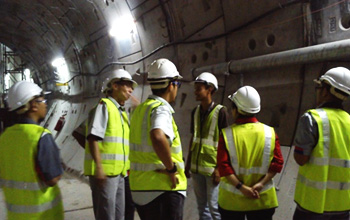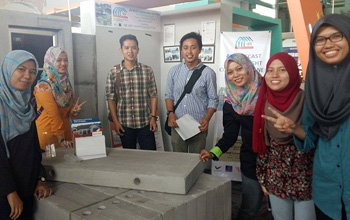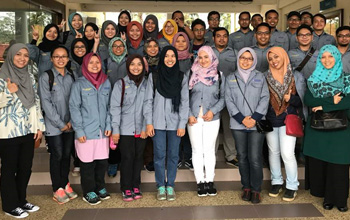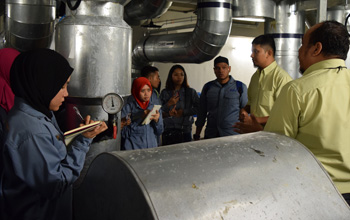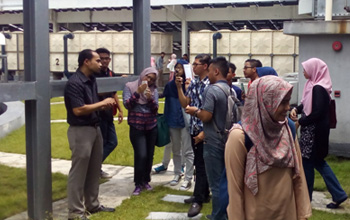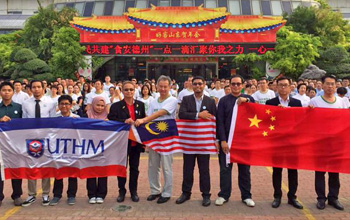Academic
The Faculty of Civil Engineering and Built Environment (FKAAB) would like to invite prospective students to pursue their studies here. Our programs are accredited by professional bodies, our facilities are top notch, our academic staff are qualified and experienced, and our past students have a good employability track record. The primary aims of our academic programmes are to ensure that graduates will apply civil engineering knowledge disseminated through our problem-based learning and hands-on teaching approach, and demonstrate complex problem solving and team working skills, which will enable them to be employed by various organisations, such as government agencies, design and consultation firms, construction companies, developers and institutes of higher education.
Undergraduate
In accordance with the university's educational philosophy, FKAAB ensures that the quality of the programmes offered meet the demand of the current job market through a market-oriented academic programme, which is student-focused and applies learning-through-experience principles. Hence, FKAAB offers a diverse programme that may be acquired either full-time on campus, or part-time through distance learning and offshore courses.
Bachelor of Civil Engineering With Honours
The Bachelor of Civil Engineering with Honours programme offered by FKAAB aims to produce graduates who possess fundamental civil engineering knowledge, problem solving skills, and team working skills in order to be employed by various organisations, including governmental agencies, consulting or design firms, construction firms, laboratories, project developers and institutes of higher learning.
Quick Info
Campus
Parit Raja
Mode
Full Time
Intake
February and September
Fees
From RM 1,600 per semester
Duration
4 years
Admission Requirements (Local)
-
- Sijil Tinggi Persekolahan Malaysia (STPM) holder with at least Grade C (NGMP 2.00) in Mathematics and any one (1) Science subject, or
- Sijil Tinggi Agama Malaysia (STAM) holder (year 2012 or earlier) with at least Pangkat Jayyid, or
- Diploma holder from public university, polytechnic or any equivalent institution with a CPA of at least 2.50, or 2 years of working experience in related fields (for those with CPA less than 2.50), or
- Kementerian Pendidikan Malaysia (KPM) Matriculation Certificate with at least Grade C in Mathematics, Physics and Chemistry.
- Credits in Bahasa Malaysia and History, and at least Grade E in English for Sijil Pelajaran Malaysia (SPM).
- At least Band 2 in the Malaysian University English Test (MUET).
Admission Requirements (International)
General Requirements
-
- General Certificate of Education ‘Advanced Level’ (GCE) ‘A’ Level Examination (UK Educational System) holder with at least three (3) principal passes obtained in one sitting, or
- International Baccalaureate (IB) holder with a minimum of six (6) subjects obtained in one sitting, or
- Diploma holder or holder any other equivalent qualification recognised by the Government of Malaysia and approved by the University Senate, or
- Holder of any other qualification equivalent to the above, which is recognised by the University Senate.
- Test of English as a Foreign Language (TOEFL, paper-based) with minimum 500 marks, or Test of English as a Foreign Language (TOEFL, internet-based) with minimum 65 marks, or International English Language Testing System (IELTS) with minimum Level 5, or Malaysian University English Test (MUET) with minimum Band 2.
Specific Requirements
- Applicants must have the following subjects taken in 'A' Levels, International Baccalaureate or any equivalent examination, and have obtained:
- A minimum grade C in Mathematics, Physics and Chemistry, AND
- A minimum grade C in English language.
The University will determine the merit and suitability of the applicant's academic grades received from their home country. The university reserves the right to determine an alternative subject relevant to Mathematics in the case where the applicant has not taken the subject in his/her examinations. The applicant must be physically able to conduct laboratory work.
Tuition Fees
| Category | Local Student | International Student |
| Total Fees (without accommodation) | RM 9,000 | RM 35,000 |
| Total Fees (with accommodation) | RM 15,000 | RM 52,000 |
|
||
Duration of Study
Four (4) years
Career Opportunities
Civil engineering offers many job options. With a degree, you can begin your career by working under the supervision of senior engineers. You may choose to work in the public or private sector, usually as part of construction projects involving buildings, roads and infrastructures. By working in these environments you will discover the requirements of the position, and you will be well-prepared for future opportunities. There are various jobs in civil engineering that awaits you after graduation. You can opt to become a consulting engineer, design engineer, contracting engineer, structural engineer, site engineer, building service engineer, environmental engineer, engineering geologist, construction manager, or building control surveyor.
DOWNLOAD PROFORMA DOWNLOAD CURRICULUM DOWNLOAD STUDY PLAN DOWNLOAD FLOW OF COURSESApplication for Admission
Undergraduate
Local Student
APPLY HERE
Undergraduate
International Student
APPLY HERE
Bachelor of Science in Architecture
The Bachelor of Science in Architecture programme offered by FKAAB strives to produce innovative and technically competent architectural graduates who will be ready to respond and engage with the community and the environment in creating sustainable built environment for the benefit of mankind.
Quick Info
Campus
Parit Raja
Mode
Full Time
Intake
February and September
Fees
From RM 1,397 per semester
Duration
3 years
Admission Requirements
Diploma
- Diploma / Diploma Kemahiran Malaysia (DKM) Level 4 or equivalent in Architecture / Architectural CADD Technology or similar from any university, polytechnic, college, training skills institute or learning institution that is recognised by the University Senate, with CGPA of at least 2.70. Those with CGPA less than 2.70 may be considered if the applicant has at least two (2) years working experience in the relevant field.
- Sijil Pelajaran Malaysia (SPM) holder with:
- a credit in Bahasa Melayu/Malaysia or Bahasa Melayu/Malaysia (July Paper) and a pass in History (SPM 2013 or later).
- at least Grade C in Mathematics and either Physics / Chemistry / Biology / Science / Engineering Drawing.
- a pass in English.
- At least Band 2 in the Malaysian University English Test (MUET).
Sijil Tinggi Persekolahan Malaysia (STPM)
- STPM holder with at least Grade C (CPA 2.00) in General Studies and any two (2) of the following subjects: Physics / Chemistry / Biology / Mathematics (M) or Mathematics (T) / Economics / Accounts / Business Studies / Information and Communication Technology / History / Geography / Bahasa Melayu / Communicative Malay Literature or English Literature / Arabic, Chinese or Tamil Language / Syariah or Usuluddin / Visual Arts / Sports Science.
- Sijil Pelajaran Malaysia (SPM) holder with:
- a credit in Bahasa Melayu/Malaysia or Bahasa Melayu/Malaysia (July Paper) and a pass in History (SPM 2013 or later).
- at least Grade C in Mathematics and either Physics / Chemistry / Biology / Science / Engineering Drawing.
- a pass in English.
- At least Band 2 in the Malaysian University English Test (MUET).
Matriculation / Foundation (Science)
- Matriculation / Foundation Certificate holder with at least Grade C (CPA 2.00) in any two (2) of the following subjects: Mathematics / Physics / Chemistry / Biology / Computer Science.
- Sijil Pelajaran Malaysia (SPM) holder with:
- a credit in Bahasa Melayu/Malaysia or Bahasa Melayu/Malaysia (July Paper) and a pass in History (SPM 2013 or later).
- at least Grade C in Mathematics and either Physics / Chemistry / Biology / Science / Engineering Drawing.
- a pass in English.
- At least Band 2 in the Malaysian University English Test (MUET).
Matriculation / Foundation (Engineering or Technical)
- Matriculation / Foundation Certificate holder with at least Grade C (CPA 2.00) in any two (2) of the following subjects: Mathematics / Engineering Physics / Engineering Chemistry / Civil, Electronic or Mechanical Engineering Studies.
- Sijil Pelajaran Malaysia (SPM) holder with:
- a credit in Bahasa Melayu/Malaysia or Bahasa Melayu/Malaysia (July Paper) and a pass in History (SPM 2013 or later).
- at least Grade C in Mathematics and either Physics / Chemistry / Biology / Science / Engineering Drawing.
- a pass in English.
- At least Band 2 in the Malaysian University English Test (MUET).
Matriculation (Accounting)
- Matriculation Certificate holder with at least Grade C (CPA 2.00) in any two (2) of the following subjects: Mathematics / Accounting / Economics / Business Management.
- Sijil Pelajaran Malaysia (SPM) holder with:
- a credit in Bahasa Melayu/Malaysia or Bahasa Melayu/Malaysia (July Paper) and a pass in History (SPM 2013 or later).
- at least Grade C in Mathematics and either Physics / Chemistry / Biology / Science / Engineering Drawing.
- a pass in English.
- At least Band 2 in the Malaysian University English Test (MUET).
Tuition Fees
| Category | Local Student | International Student |
| Total Fees (without accommodation) | RM 7,000 | RM 29,000 |
| Total Fees (with accommodation) | RM 12,000 | RM 41,000 |
|
||
Duration of Study
Three (3) years
Career Opportunities
With a Bachelor of Science in Architecture degree, you begin your career as an Assistant Architect under the supervision of a Professional Architect. You may later embark on future opportunities, such as becoming a product designer, urban or regional planner, industrial designer, architectural structure specialist, 3D visualiser, interior designer, building inspector, historic preservationist or green building specialist.
DOWNLOAD PROFORMA DOWNLOAD CURRICULUMApplication for Admission
Undergraduate
Local Student
APPLY HERE
Undergraduate
International Student
APPLY HERE
Postgraduate
FKAAB offers high quality postgraduate programmes that are supported by a vastly experienced teaching and supervisory team, and learning and research facilities that are conducive and well-equipped. The postgraduate programmes provide limitless possibilities at the frontier of knowledge and innovation within the civil and environmental engineering disciplines. The quality of our graduate programmes meet the standards set by the Malaysian Ministry of Education (MOE) and the Malaysian Qualification Agency (MQA).
Master of Civil Engineering (Coursework / Research)
The Master of Civil Engineering programme offered by FKAAB aims to produce professionals with vast knowledge and advanced skills in civil engineering design and analysis. Our flexible programme allows you to specialise in a specific civil engineering discipline and develop a strong background in civil engineering.
Quick Info
Campus
Parit Raja
Mode
Full Time or Part Time
Intake
February and September
Fees
From RM 3,245
Duration
1 - 5 years
Admission Requirements
-
- A bachelor's degree in the field or related fields with a minimum CGPA of 2.75 or equivalent, as accepted by UTHM Senate; or
- A bachelor's degree in the field or related fields or equivalent with a minimum CGPA of 2.50 and not meeting CGPA of 2.75, can be accepted subject to rigorous internal assessment; or
- A bachelor's degree in the field or related fields or equivalent with minimum CGPA of 2.00 and not meeting CGPA of 2.50, can be accepted subject to a minimum of 5 years working experience in the relevant field and rigorous internal assessment.
- Candidates without a qualification in the related fields or relevant working experience must undergo appropriate prerequisite courses determined by UTHM and meet the minimum CGPA based on (i) to (iii).
- Applicants with APEL-T7 qualification (Applicable for Malaysian Citizen Only) can be accepted.
- A minimum score of MUET Band 3.5, IELTS 5.0, TOEFL iBT 40, TOEFL Essentials (Online) 7.5, Pearson Test of English (PTE) 47, Linguaskill Online 154, ELS 107. Exemption shall be granted to applicants who graduated with academic qualifications from Higher Learning Institutions in Malaysia.
Tuition Fees
| Master | |||
| Mode of Study | Item | Local | International |
| Coursework (Full Time) | First time registration | RM 2130 | USD 986 |
| Recurring fees | RM 1730 | USD 875 | |
| Research (Full Time) | First time registration | RM 2590 | USD 1030 |
| Recurring fees | RM 1820 | USD 837 | |
| Viva voce fees | RM 900 | USD 200 | |
| Research (Part Time) | First time registration | RM 2066 | N/A |
| Recurring fees | RM 1296 | ||
| Viva voce fees | RM 900 | ||
| Master by Coursework (Part Time) for Local Students only | |||
| Item | UTHM | Peninsular Malaysia | East Malaysia |
| First time registration | RM 960 | RM 960 | RM 1025 |
| Recurring fees | RM 535 | RM 535 | RM 600 |
| Tuition fees (per semester) | RM 1750 | RM 2730 | RM 3150 |
Duration of Study
Full-time: One (1) to three (3) years, Part-time: Two (2) to five (5) years
Master of Built Environment
The Master of Built Environment program is developed based on the TVET approach, encompassing research based on hands-on practical and theoretical exploration and utilizing cutting-edge equipment, software, and high-performance laboratories available at Universiti Tun Hussein Onn Malaysia. Offered by the Faculty of Civil Engineering and Built Environment, which boasts a diverse pool of expertise, this distinguishes the Master of Built Environment program at Universiti Tun Hussein Onn Malaysia as uniquely robust, spanning various research subfields and thereby fostering the capacity for supervision across a wide range of built environment topics. Furthermore, the faculty has active and comprehensive research centers and groups spanning diverse built environment domains. The collaboration of expertise and infrastructure within the faculty renders the Master of Built Environment program at Universiti Tun Hussein Onn Malaysia a holistic and flexible research-focused program.
Quick Info
Campus
Parit Raja
Mode
Full Time or Part Time
Intake
February and September
Fees
From RM 3,245
Duration
1 - 5 years
Admission Requirements
- A bachelor's degree in the field or related fields with a minimum CGPA of 2.75 or equivalent, as accepted by UTHM Senate; or
- A bachelor's degree in the field or related fields or equivalent with a minimum CGPA of 2.50 and not meeting CGPA of 2.75, can be accepted subject to rigorous internal assessment; or
- A bachelor's degree in the field or related fields or equivalent with minimum CGPA of 2.00 and not meeting CGPA of 2.50, can be accepted subject to a minimum of 5 years working experience in the relevant field and rigorous internal assessment.
- Candidates without a qualification in the related fields or relevant working experience must undergo appropriate prerequisite courses determined by UTHM and meet the minimum CGPA based on (1) to (3)
- Applicants should fulfil the minimum English proficiency level as approved by Senate Bil. 6/2022/2023 (Kali ke-224).
- Applicants with APEL-T7 qualification (Applicable for Malaysian Citizen Only) can be accepted.
- Applicants who graduated with academic qualification from Higher Learning Institutions from foreign countries listed as the English Speaking Countries are eligible to apply for exemption from the English Language Proficiency requirements.
Career Opportunities
- Competent Researchers
- Analysts: Building Performance Analyst, Buildings Inspector
- Academic Members (Lecturers/Tutors)
- Industry Experts: Sustainability Consultant, Heritage Conservation Specialist, Design Consultant Specialist, Town Planner, Specialized Architect, Conservation Architect
Application for Admission
Postgraduate Student
APPLY HEREMaster (Part-Time)
APPLY HEREDoctor of Philosophy in Civil Engineering
The Doctor of Philosophy (PhD) in Civil Engineering programme offered by FKAAB will involve extensive and original research in any field of civil engineering of your choice, with outcomes that will effectively contribute to intellectual knowledge. Through our PhD programme, you will have the opportunity to develop and demonstrate a multitude of skills that will help you to become a world leading industry or academic professional.
Quick Info
Campus
Parit Raja
Mode
Full Time or Part Time
Intake
February and September
Fees
From RM 9,430
Duration
3 - 9 years
Admission Requirements
-
- A master's degree in the field or related fields accepted by UTHM Senate; or
- Other qualifications equivalent to a master's degree recognised by the Government of Malaysia.
- Candidates without a related qualification in the field/s or working experience in the relevant fields must undergo appropriate prerequisite courses determined by UTHM (Rigorous Assessment).
- Applicants with APEL-T78 qualification (Applicable for Malaysian Citizen Only) can be accepted.
- A minimum score of MUET Band 3.5, IELTS 5.0, TOEFL iBT 40, TOEFL Essentials (Online) 7.5, Pearson Test of English (PTE) 47, Linguaskill Online 154, ELS 107. Exemption shall be granted to applicants who graduated with academic qualifications from Higher Learning Institutions in Malaysia.
Tuition Fees
| Doctor of Philoshopy | |||
| Mode of Study | Item | Local | International |
| Research (Full Time) | First time registration | RM 2980 | USD 1117 |
| Recurring fees | RM 1910 | USD 857 | |
| Viva voce fees | RM 1800 | USD 400 | |
| Research (Part Time) | First time registration | RM 2740 | N/A |
| Recurring fees | RM 1670 | ||
| Viva voce fees | RM 1800 | ||
Duration of Study
Full-time: Three (3) to seven (7) years, Part-time: Four (4) to nine (9) years
Doctor of Philosophy in Built Environment
Embark on a journey of academic excellence with our Doctor of Philosophy in Built Environment program, meticulously crafted around the innovative TVET approach. Delve into immersive, hands-on practical and theoretical research experiences utilizing cutting-edge equipment, software, and high-performance laboratories provided by Universiti Tun Hussein Onn Malaysia. This program boasts a rich tapestry of expertise, offering unparalleled depth and breadth across various research subfields. This unique blend equips students with the skills and knowledge to conduct a wide array of built environment topics confidently and proficiently. Step into a vibrant research ecosystem within the faculty, where active research centers and groups thrive across diverse built environment domains. Experience the synergy of collaborative expertise and top-tier infrastructure, shaping a holistic and flexible research-focused program tailored to your academic and professional aspirations. Unlock your potential and shape the future of built environments with us.
Quick Info
Campus
Parit Raja
Mode
Full Time or Part Time
Intake
February and September
Fees
From RM 9,430
Duration
3 - 9 years
Admission Requirements
- A master's degree in the field or related fields accepted by UTHM Senate; or
- Other qualifications equivalent to a master's degree recognised by the Government of Malaysia.
- Candidates without a related qualification in the field/s or working experience in the relevant fields must undergo appropriate prerequisite courses determined by UTHM.
- Applicants with APEL-T8 qualification (Applicable for Malaysian Citizen Only) can be accepted.
- First class Bachelor Degree graduates (CPA 3.67 / 4.0) and above may apply for Fast Track PhD (term and condition apply).
- Applicants should fulfil the minimum English proficiency level as approved by Senate Bil. 6/2022/2023 (Kali ke-224).
- Applicants who graduated with academic qualification from Higher Learning Institutions from foreign countries listed as the English Speaking Countries are eligible to apply for exemption from the English Language Proficiency requirements.
Career Opportunities
- Competent Researchers
- Analysts: Building Performance Analyst, Buildings Inspector
- Academic Members (Lecturers/Tutors)
- Industry Experts: Sustainability Consultant, Heritage Conservation Specialist, Design Consultant Specialist, Town Planner, Specialized Architect, Conservation Architect
Application for Admission
Postgraduate Student
APPLY HERE
Postgraduate Study by Research
Find an expert
STRUCTURE & MATERIALS WATER & ENVIRONMENT INFRASTRUCTURE & GEOMATIC BUILDING & CONSTRUCTION ARCHITECTUREOutcome Based Education (OBE)
Outcome Based Education (OBE) has been the emphasis here in FKAAB, primarily in curriculum design and delivery. OBE is simply a concept that sets each part of an educational system around targeted goals or outcomes. These targeted goals or outcomes which should be tangible and measurable are then translated into a quantity with the purpose to reflect the quality of the educational system. Every student is deemed to have achieved these targeted goals or outcomes by the end of their educational experience in FKAAB. Here at FKAAB, we esteem in highlighting the achieved outcomes of our programmes. This section presents the Programme Educational Objectives (PEO) and Programme Learning Outcomes (PLO) for our undergraduate and postgraduate programmes.
PEOs and PLOs » Bachelor of Civil Engineering With Honours
Programme Educational Objectives (PEOs) for Bachelor of Civil Engineering with Honours (BFF)
| No. | PEO | Attained via |
| 1 | Knowledgeable and technically competent in civil engineering discipline in-line with the industry requirement. | PLO 1, 3, 5 |
| 2 | Effective in communication and demonstrate good leadership quality in an organisation. | PLO 6, 8, 9 |
| 3 | Capable to solve civil engineering problems innovatively, creatively and ethically through sustainable approach. | PLO 2, 4, 6, 7 |
| 4 | Able to demonstrate entrepreneurship skills and recognise the need of lifelong learning for successful career advancement. | PLO 10, 11 |
Programme Learning Outcomes (PLOs) for Bachelor of Civil Engineering with Honours (BFF)
| No. | Key Idea | PLO | Knowledge & Attitude Profile (WK) |
| 1 | Engineering Knowledge | Apply knowledge of mathematics, natural science, computing and engineering fundamentals, and an engineering specialization as specified in WK1 to WK4 respectively to develop solutions to complex engineering problems. | WK1 to WK4 |
| 2 | Problem Analysis | Identify, formulate, research literature and analyze complex engineering problems reaching substantiated conclusions using first principles of mathematics, natural sciences and engineering sciences with holistic considerations for sustainable development (WK1 to WK4). | WK1 to WK4 |
| 3 | Design / Development of Solutions | Design creative solutions for complex engineering problems and design systems, components or processes to meet identified needs with appropriate consideration for public health and safety, whole-life cost, net zero carbon as well as resource, cultural, societal, and environmental considerations as required (WK5). | WK5 |
| 4 | Investigation | Conduct investigation of complex engineering problems using research methods including research-based knowledge, including design of experiments, analysis and interpretation of data, and synthesis of information to provide valid conclusions (WK8). | WK8 |
| 5 | Tool Usage | Create, select and apply, and recognize limitation of appropriate techniques, resources, and modern engineering and IT tools, including prediction and modelling, to complex engineering problems (WK2 and WK6). | WK2 and WK6 |
| 6 | The Engineer and the World | Analyze and evaluate sustainable development impacts to: society, the economy, sustainability, health and safety, legal frameworks, and the environment, in solving complex engineering problems (WK1, WK5, and WK7). | WK1, WK5 and WK7 |
| 7 | Ethics | Apply ethical principles and commit to professional ethics and norms of engineering practice and adhere to relevant national and international laws. Demonstrate an understanding of the need for diversity and inclusion (WK9). | WK9 |
| 8 | Individual and Collaborative Team Work | Function effectively as an individual, and as a member or leader in diverse and inclusive teams and in multidisciplinary, face-to-face, remote and distributed settings (WK9). | WK9 |
| 9 | Communication | Communicate effectively and inclusively on complex engineering activities with the engineering community and with society at large, such as being able to comprehend and write effective reports and design documentation, make effective presentations, taking into account cultural, language, and learning differences. | EA1 to EA5 |
| 10 | Project Management and Finance | Apply knowledge and understanding of engineering management principles and economic decision-making and apply these to one’s own work, as a member and leader in a team, and to manage projects in multidisciplinary environments. | - |
| 11 | Life Long Learning | Recognise the need for, and have the preparation and ability for i) independent and life-long learning ii) adaptability to new and emerging technologies and iii) critical thinking in the broadest context of technological change (WK8). | WK8 |
The curriculum encompasses Knowledge and Attitude Profiles (WK) as summarised in the table below:
| Knowledge & Attitude Profile | Description |
| WK1 | A systematic, theory-based understanding of the natural sciences applicable to the discipline. |
| WK2 | Conceptually-based mathematics, numerical analysis, statistics and formal aspects of computer and information science to support analysis and modelling applicable to the discipline. |
| WK3 | A systematic, theory-based formulation of engineering fundamentals required in the engineering discipline. |
| WK4 | Engineering specialist knowledge that provides theoretical frameworks and bodies of knowledge for the accepted practice areas in the engineering discipline; much is at the forefront of the discipline. |
| WK5 | Knowledge that supports engineering design in a practice area. |
| WK6 | Knowledge of engineering practice (technology) in the practice areas in the engineering discipline. |
| WK7 | Comprehension of the role of engineering in society and identified issues in engineering practice in the discipline: ethics and the professional responsibility of an engineer to public safety; the impacts of engineering activity: economic, social, cultural, environmental and sustainability. |
| WK8 | Engagement with selected knowledge in the research literature of the discipline. |
The curriculum also includes Complex Engineering Activities (EA) as follows:
| Complex Engineering Activity | Attribute | Description |
| EA1 | Range of sources | Involve the use of diverse resources including people, data and information, natural, financial and physical resources and appropriate technologies including analytical and/or design software |
| EA2 | Level of interactions | Require optimal resolution of interactions between wide-ranging and/or conflicting technical, nontechnical, and engineering issues |
| EA3 | Innovation | Involve creative use of engineering principles, innovative solutions for a conscious purpose, and research-based knowledge |
| EA4 | Consequences to society and the environment | Have significant consequences in a range of contexts, characterised by difficulty of prediction and mitigation |
| EA5 | Familiarity | Can extend beyond previous experiences by applying principle-based approaches |
PEOs and PLOs » Bachelor of Civil Science in Architecture
Programme Educational Objectives (PEOs) for Bachelor of Science in Architecture (BFR)
| No. | PEO |
| 1 | Fulfill the industrial requirements on architecture based on the knowledge and skills acquired. |
| 2 | Design marketable architectural ideas creatively and innovatively. |
| 3 | Practice professional responsibilities ethically through the engagement of lifelong learning. |
| 4 | Propose ideas on architectural issues effectively and display good leadership quality. |
Programme Learning Outcomes (PLOs) for Bachelor of Science in Architecture (BFR)
| No. | Key Idea | PLO | Domain |
| 1 | Engineering Knowledge (K) | Demonstrate understanding of cultural, historical and established architectural theories, philosophies and context in various architectural scenarios and community scales. | Cognitive |
| 2 | Practical / Technical Skills/ Modern Tool Usage (PS) | Produce a comprehensive solution to various architectural problems using appropriate practical technology, established regulations and appropriate design skills. | Psychomotor |
| 3 | Critical Thinking and Problem Solving / Investigation (CTPS) | Demonstrate creativity, innovation and imagination in addressing particular issue(s) and/or problem(s) to devise a feasible solution. | Cognitive |
| 4 | Communication Skills (CS) | Apply effective visual, verbal and written communication method and media to deliver convincing design solution using appropriate architectural convention. | Affective |
| 5 | Individual / Team Work and Leadership Skills / Project Management and Finance (LS) | Lead, work, function and participate in specific role in performing task in a team. | Psychomotor |
| 6 | Entrepreneurship Skills (ES) | Seek opportunity and use of appropriate skill towards self-sustenance. | Psychomotor |
| 7 | Life Long Learning (LL) | Engage in a voluntary, self-motivated and continuous acquisition of knowledge to keep abreast of any developments in architectural field. | Affective |
| 8 | Ethics and Professionalism Values (ET) | Display appropriate behaviour according to architectural industry standard, moral standing and environmental ethics. | Affective |
PEOs and PLOs » Master By Coursework
Programme Educational Objectives (PEOs) for Master By Coursework Programme (MFA)
| No. | PEO | PLO |
| 1 | Competent in the field of Civil Engineering to expand the quality of knowledge through research, consultation, writing and publication. (Knowledge and Practical Skill) | 1, 3, 7 |
| 2 | Demonstrate excellent leadership through effective communication with effective cooperation among researchers and stakeholders. (Soft Skill) | 4, 5, 8, 10 |
| 3 | Solve Civil Engineering problems innovatively, creatively and manage information for lifelong learning. (Problem Solving Skill) | 2, 6, 9, 11 |
Programme Learning Outcomes (PLOs) for Master by Coursework Programme (MFA)
| No. | Key Idea | PLO | PEO |
| 1 | Knowledge and Understanding | Apply knowledge critically and integratively to manage and resolve complex Civil Engineering problems using advanced techniques, tools or approaches. | PEO 1 |
| 2 | Cognitive Skills | Solve and manage complex Civil Engineering problems through understanding, critical thinking and comprehensive assessment. | PEO 3 |
| 3 | Practical Work Skills | Demonstrate work and operational skills capabilities among peers and other groups in planning, organizing, selection of tools, material, technology methods, design, procedures and solve problems using the principles of Civil Engineering. | PEO 1 |
| 4 | Interpersonal Skills | Interact effectively through communications and collaboration in managing relationships within team members, peers or organisations by using broad range of information, media and technology applications. | PEO 2 |
| 5 | Communication Skills | Convey information, ideas, reports cogently and professionally in appropriate language using combination of numerical and graphical/visual data. | PEO 2 |
| 6 | Digital Skills | Manage information effectively through media, software and technology applications for sourcing, storing, processing and problem solving. | PEO 3 |
| 7 | Numeracy Skills | Use quantitative, statistical and mathematical approaches to design, analyze and evaluate Civil Engineering problems. | PEO 1 |
| 8 | Leadership, Autonomy and Responsibility | Display significant autonomy, independence, leadership, and interpersonal skills as well as show substantial responsibility in planning, problem solving and managing work. | PEO 2 |
| 9 | Personal Skills | Portray an enthusiasm for independent learning, intellectual and self development by demonstrating confidence, self-control, social skills, etiquette and commitment. | PEO 3 |
| 10 | Entrepreneurial Skills | Shows personal qualities to include creativity and grit in lead entrepreneurial ventures. | PEO 2 |
| 11 | Ethics and Professionalism | Demonstrate adherence to legal, ethical and professional codes of practice to solve complex civil engineering problems. | PEO 3 |
PEOs and PLOs » Master by Research
Programme Educational Objectives (PEOs) for Master By Research Programme (KFA)
| No. | PEO | PLO |
| 1 | Competent in the field of Civil Engineering to expand the quality of knowledge through research, consultation, writing and publication. (Knowledge and Practical Skill) | 1, 3, 7 |
| 2 | Demonstrate excellent leadership through effective communication with effective cooperation among researchers and stakeholders. (Soft Skill) | 4, 5, 8, 10 |
| 3 | Solve Civil Engineering problems innovatively, creatively and manage information for lifelong learning. (Problem Solving Skill) | 2, 6, 9, 11 |
Programme Learning Outcomes (PLOs) for Master by Research Programme (KFA)
| No. | Key Idea | PLO | PEO |
| 1 | Knowledge and Understanding | Demonstrate originality and independence in undertaking analytical and critical evaluation, and synthesis of complex information, specialized concepts, theories, methods and practice in civil engineering as a basis for research. | PEO 1 |
| 2 | Cognitive Skills | Conduct standard and specialized research approaches to solve and manage complex Civil Engineering problem through knowledge and understanding in latest development. | PEO 3 |
| 3 | Practical Work Skills | Demonstrate practical work skills professionally in related works using appropriate methods to peers and experts in Civil Engineering. | PEO 1 |
| 4 | Interpersonal Skills | Demonstrate interpersonal skill to include interactive communications and networking by using broad range of information, media and technology applications in managing relationship within organisations and community. | PEO 2 |
| 5 | Communication Skills | Communicate interactively by using combination of numerical, graphical/visual data to convey information, ideas and cogently in appropriate language. | PEO 2 |
| 6 | Digital Skills | Use a wide range of suitable digital technologies and appropriate software to enhance research include sourcing, storing information and processing data to support and generate solutions for problem solving with ethics. | PEO 3 |
| 7 | Numeracy Skills | Competently use mathematical and other quantitative, qualitative tools to design, analyze and evaluate numerical and graphical data for solutions of Civil Engineering problem. | PEO 1 |
| 8 | Leadership, Autonomy and Responsibility | Demonstrate leadership, autonomy and responsibility through ability to build relationships and work with teams in multi-disciplinary settings among peers and experts. | PEO 2 |
| 9 | Personal Skills | Portray substantial responsibility in independent learning and planning, self-development, resource management and social skills with confidence, self control and proper etiquette. | PEO 3 |
| 10 | Entrepreneurial Skills | Show personal qualities for product and service commercialization using proper entrepreneurial skills. | PEO 2 |
| 11 | Ethics and Professionalism | Demonstrate adherence to legal, ethical and professional codes of practice in order to contribute and solve societal problems. | PEO 3 |
PEOs and PLOs » Doctor of Philosophy
Programme Educational Objectives (PEOs) for Doctor of Philosophy Programme (PFA)
| No. | PEO | PLO |
| 1 | Competent in the field of Civil Engineering to expand the quality of knowledge through research, consultation, writing and publication. (Knowledge and Practical Skill) | 1, 3, 7 |
| 2 | Demonstrate excellent leadership through effective communication with effective cooperation among researchers and stakeholders. (Soft Skill) | 4, 5, 8, 10 |
| 3 | Solve Civil Engineering problems innovatively, creatively and manage information for lifelong learning. (Problem Solving Skill) | 2, 6, 9, 11 |
Programme Learning Outcomes (PLOs) for Doctor of Philosophy Programme (PFA)
| No. | Key Idea | PLO | PEO |
| 1 | Knowledge and Understanding | Demonstrate a comprehensive, systematic and integrated acquisition for complex and current critical issues in the most advanced frontiers of knowledge in Civil Engineering. | PEO 1 |
| 2 | Cognitive Skills | Critically analyze, evaluate and synthesize new, complex and current critical issue through advanced knowledge and refine existing concept and practices in Civil Engineering. | PEO 3 |
| 3 | Practical Work Skills | Demonstrate mastery of practical and technical skills to resolve new highly complex and emerging problems through implementation and adaptation of highly advanced and specialized method in Civil Engineering. | PEO 1 |
| 4 | Interpersonal Skills | Demonstrate interpersonal skill to include interactive communications and networking by using broad range of information, media and technology applications in managing relationship within organisations, community and society. | PEO 2 |
| 5 | Communication Skills | Communicate and convey information, insight ideas, problems and defence solutions effectively and professionally. | PEO 2 |
| 6 | Digital Skills | Competently use a wide range of suitable digital technologies and appropriate software to enhance research include sourcing, storing information and processing data to support and generate solutions for problem solving with ethics. | PEO 3 |
| 7 | Numeracy Skills | Competently demonstrate mathematical and other quantitative, qualitative tools to design, analyze and critically evaluate numerical and graphical data for solutions of Civil Engineering problem. | PEO 1 |
| 8 | Leadership, Autonomy and Responsibility | Demonstrate leadership, professionalism and management skills to take full responsibility with substantial autonomy in the conducting engineering and community activities. | PEO 2 |
| 9 | Personal Skills | Integrate knowledge for lifelong learning with development of new ideas and solutions by demonstrating good self-development, resource management, social skill, ettiquette and responsibility for own work in work environment and career development. | PEO 3 |
| 10 | Entrepreneurial Skills | Integrate the research work for commercialization using proper entrepreneurial skills. | PEO 2 |
| 11 | Ethics and Professionalism | Demonstrate adherence to legal, ethical and professional codes of practice in order to continously contribute and solve societal problems. | PEO 3 |
Accreditation
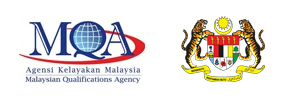
All undergraduate and postgraduate programmes offered by FKAAB are accredited by the Malaysian Qualifications Agency (MQA), which formally recognises that a programme has attained the quality standards and criteria set by MQA and is in compliance with the Malaysian Qualifications Framework (MQF).
VIEW OUR ACCREDITATION MALAYSIAN QUALIFICATIONS FRAMEWORK
In addition to that, our Bachelor of Civil Engineering with Honours (BFF) programme is also accredited until 2027* by the Engineering Accreditation Council (EAC), a delegated body by the Board of Engineers Malaysia (BEM) that is a signatory of the Washington Accord. EAC is the only recognised accrediting body for engineering degree programmes offered in Malaysia. The council comprises of members from BEM, Institution of Engineers Malaysia (IEM), Malaysian Qualifications Agency (MQA) and Public Service Department (JPA).
VIEW OUR ACCREDITATION (2022-2027) VIEW OUR ACCREDITATION (2017-2021) EAC STANDARDOur Bachelor of Science in Architecture (BFR) programme has received accreditation until 2025* by the Council of Architectural Accreditation and Education Malaysia, Board of Architects Malaysia (LAM).
VIEW OUR ACCREDITATION (2020-2025)* Note: Accreditation is renewed on a cyclical basis. The Faculty commits to the re-accreditation process prior to this expiry year.
Engineering Practice Exposure
In FKAAB, we prepare our students for their careers by exposing them to engineering practice throughout our curriculum. With more than 40 Professional Engineers amongst our teaching staff, we ensure students are exposed to common practices in the industry, complex problem solving and professional work ethics through specially designed courses such as Engineers & Society and Professionals At Work. In addition, students are taken on industry visits to gain first-hand experience.
Students will also conduct industry-based projects in their Final Year Project (FYP), Integrated Design Project (IDP) and Industrial Training courses. Apart from that, guest lectures and seminars by industry practitioners are embedded into courses, while members of our Industrial Advisory Panel are not only actively involved in examining our curriculum and providing valuable suggestions to suit current needs in the industry, but are also involved in assessing FYP and IDP student projects.
Industrial Visits and Training
